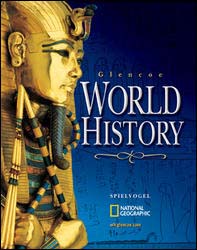Glencoe World HistoryChapter 4:
Ancient Greece, 1900–133 B.C.Web Activity Lesson PlansIntroduction
Alexander conquered a large amount of territory in a remarkably short time.
Despite his many invasions and conquests, he gained the respect of many of those
he conquered by showing respect for local cultures and rulers. Although his
empire was short-lived, it left an enduring Greek cultural imprint on the civilizations
that had been conquered. In this activity students will learn more about Alexander's
conquest in Southwest Asia. Lesson Description
Students will go to the Alexander the Great Web site to read about Alexander's
conquests of Persia and India. They will answer four questions about what they
have read and will then write a fictional Indian or Persian newspaper article
reporting on local reactions to Alexander's conquest. Instructional Objectives - Students will be able to describe how local inhabitants would have perceived
Alexander the Great and his invading forces.
- Students will be able to analyze the complexities of Alexander's motivations
as a leader.
Student Web Activity Answers - Officially, Alexander was invading the Persian Empire to rid the world of
tyranny and oppression. He also wanted to avenge the Persian invasion of Greece
in 490 B.C.E. Alexander was also motivated by a personal longing to see the
Ocean, which he believed encircled Europe and Asia.
- Alexander began to wear Persian clothing. He also established programs to
teach the Persians about Greek and Macedonian cultures, and he encouraged
marriage between his officers and Persian women.
- The Brahmins were respected Indian philosophers. Alexander sought them out
and engaged them in philosophical debate. In India he gained a reputation
as a wise philosopher and a fearless conqueror.
- Alexander treated many of his defeated enemies with great respect. When
the emperor Darius was killed by his own men, Alexander executed the men and
gave Darius a royal funeral. Following the capture of Porus, a powerful Indian
leader, Alexander allowed Porus to continue to govern. Alexander even granted
Porus an additional province.
- Students' newspaper articles will vary but should include details on Alexander's
conquests found in the article.
 | 






